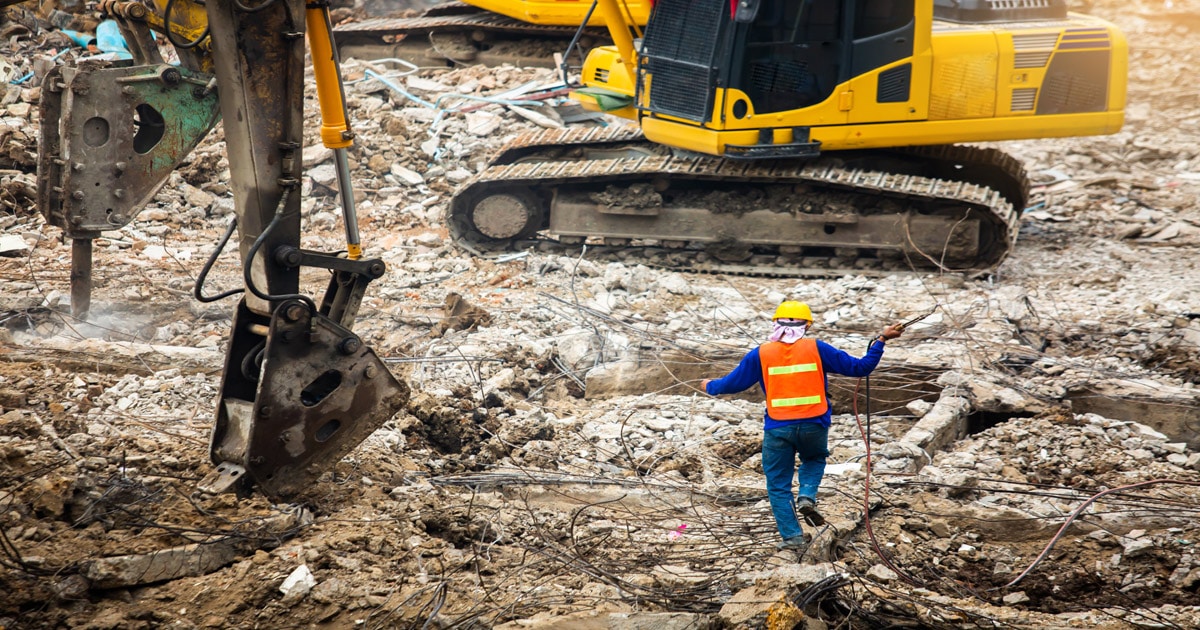
Often, before a new structure can be constructed, another must be torn down. Buildings and other structures can be deconstructed piece by piece, mechanically destroyed with bulldozers and other equipment, or demolished using explosives.
All of these demolition methods are inherently dangerous and pose a risk of catastrophic injuries to everyone on site. These injuries can leave workers with long-term or permanent pain and disability. Learn more about the risks of demolition projects and what to do if you are hurt on the job.
Why Is Demolition So Dangerous?
The Occupational Safety and Health Administration (OSHA) defines demolition as the “dismantling, razing, destroying or wrecking of any building or structure or any part thereof.” Demolition is hazardous in part because it involves unknown hazards. During the construction of a new structure, workers have more control over the tools and materials.
Even on the most professional, well-managed construction site, demolition can be unpredictable. Workers may encounter gas lines, power sources, and lead, asbestos, and other hazardous materials. They are at risk of falls and being struck by or stuck between large objects.
Demolition Injuries
According to a report from OSHA, workers in transportation and construction accounted for nearly half of all fatal workplace injuries in 2020. That same year, more than 174,000 construction industry injuries and illnesses were reported in this country. Because demolition and construction share many of the same risks and hazards, they also share many common injuries.
Demolition injuries include:
- Broken Bones
- Burns
- Cuts, lacerations, and punctures
- Exposure to toxic materials
- Eye injuries
- Neck and back injuries
- Sprains and strains
- Traumatic brain injuries (TBI)
The Fatal Four in Construction and Demolition
Through accident reporting and standards cited at sites across the country, OSHA has identified the most common construction hazards facing workers today. Because these hazards are so dangerous, they are referred to as the “Fatal Four.”
-
Falls
Falls make up around 35 percent of all construction and demolition accidents, making it the most common among the Fatal Four. Falls on wet or damaged flooring can be just as dangerous as falls from heights.
Workers can fall from any surface off the ground including ladders, scaffolds, and roofs. Fall injuries depend upon the nature of the accident, the force involved in the fall, and if the worker was wearing any type of protective equipment at the time.
-
Electrocutions
Demolition often takes place near power lines and other power sources. If these risks are not properly addressed prior to demolition, workers can suffer electrical injuries from direct contact with electrical current. Electrical injuries include thermal burns, muscle, nerve, and tissue damage, and cardiac arrest.
-
Struck-By Accidents
Struck-by accidents happen when a worker becomes pinned between a moving and a fixed object. Demolition workers can be struck by vehicles, cranes, falling or flying objects, and concrete or masonry walls that are being destroyed. As one section of a structure is demolished, the structural integrity of other areas can become compromised, increasing the chance of a collapse.
-
Caught In/Between Accidents
“Caught-in” and “caught-between” demolition accidents involve cave-ins and other excavation dangers, contact with cranes and other large equipment, and being pulled into unguarded machinery.
Here, “excavation” refers to the removal of earth, rocks, and other materials from the ground. It is typically a part of the demolition process. Because excavation leaves the ground unstable, workers can become trapped in trenches and potentially be deprived of oxygen or exposed to toxic gases. Cave-ins can cause crushing injuries as well.
Poor Preparation is the Most Commonly-Cited OSHA Standard
With all that we know about the risks of demolition, you are probably wondering why so many accidents happen every year. OSHA reports that “preparatory operations” is the most commonly reported standard on demolition worksites, accounting for three-quarters of all reported safety issues.
In particular, OSHA standard 1926.850(a)(1) which requires an engineering survey prior to demolition accounts for over half of “preparatory operations” citations. Demolishing a structure requires incredible precision, especially if the building is in a residential area, close to other structures.
OSHA requires a “competent person” to assess the condition of walls, framing, and doors, and assess the likelihood of an “unplanned collapse of any portion of the structure.” While the survey should always be completed prior to any demolition project, OSHA reminds workers a survey is a “living” document that may change as building conditions evolve.
Other Causes of Demolition Worker Injuries
While poor preparation and the lack of an engineering survey is the leading cause of demolition accidents, there are some other reasons why these dangerous events occur. Lack of proper training and proper protective equipment along with failure to comply with OSHA standards all increase the chance of work injuries.
I Was Injured Doing Demolition at Work. Am I Entitled to Compensation?
A serious demolition injury can be life-changing. Beyond the medical care and physical symptoms, some conditions can be permanently temporary or permanently disabling.
The Pennsylvania Workers’ Compensation Act provides compensation for lost wages and medical benefits for employees dealing with work-related injury or illness. (It also provides death benefits for the survivors of a worker who dies due to a fatal work accident or occupational illness.)
A work injury is likely compensable under the law if:
- It was caused by a specific incident.
- It is a repetitive use injury, like carpal tunnel syndrome.
- It is a pre-existing condition that has been made worse by work activities.
What Should I Do If I Get Hurt During Demolition?
If you are injured while engaged in demolition activities on the job site, medical attention should be your first priority. Next, you must report the injury to your employer as soon as possible, preferably in writing. Follow your employer’s procedures for completing an incident report.
Seek medical attention from the list of approved providers with 90 days of the initial accident. Be sure to let your doctor know the injury is work-related. Within 21 days of the injury, your employer and/or their insurance company are required to let you know if they agree that you sustained a work injury.
If you were hurt at work, it is important that you know your rights under the law. You may receive Workers’ Compensation for your medical expenses and lost income while you are unable to work. A skilled attorney is your best resource for insight into your situation.
They will either issue a Notice of Compensation Payable or a Notice of Compensation Deniable. The former confirms your condition is accepted as a work injury under the law. If your claim is denied, you have the right to appeal and should seek the assistance of an experienced Workers’ Compensation lawyer to lead your appeal.
The majority of companies in Pennsylvania must carry Workers’ Compensation insurance which means coverage is available to protect many workers across the state. Your attorney can clarify if you are eligible for compensation and clarify which benefits are available based on your condition and your case.
Coatesville Workers’ Compensation Lawyers at Wusinich, Sweeney & Ryan, LLC, Represent Pennsylvania’s Injured Workers
If you were injured or contracted an illness due to conditions at your job, you may be entitled to Workers’ Compensation benefits. Coatesville Workers’ Compensation lawyers at Wusinich, Sweeney & Ryan advocate for injured workers across Pennsylvania. Call 610-594-1600 or contact us online to schedule a free case review today. Located in Exton, we work with clients in and around West Chester, Downingtown, Exton, Phoenixville, Wagontown, Malvern, Lyndell, Uwchland, Parkesburg, Chester Springs, Reading, Morgantown, and all of Chester County and Pennsylvania.




